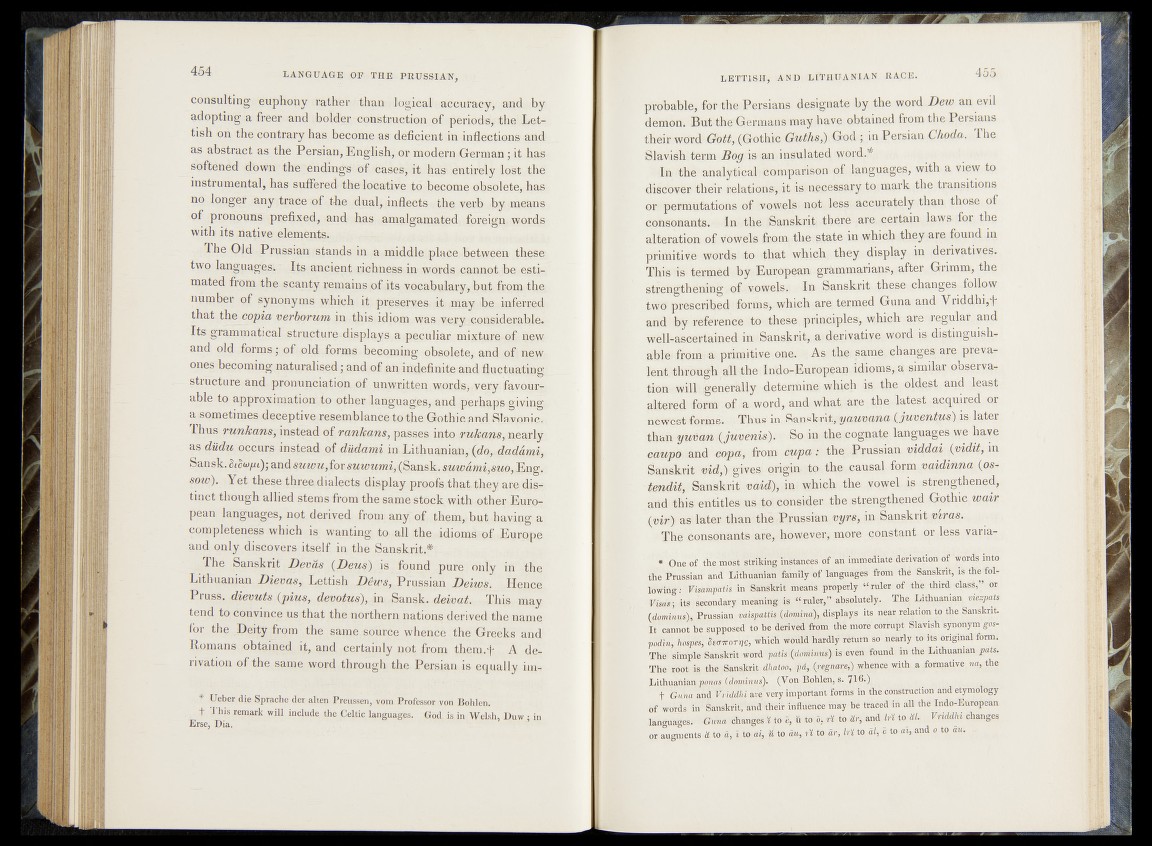
consulting euphony ratbeuafchariu logical - aceuraGyi'/and by
adopting a freer and i,bolder * cmalstruetion ofo^feriods, the Let-
tish on the contrary has become as deficient in inflections and
as abstract as the Persian, English? o r modern German; it has
softened dbwn the endings of cases, it has'entirely lost the
instrumental, has suffered'the locative to become obsolete, has
no longer any trace ^ , i h e .dual, inflects. the verb .by means
of pronouns prefixed, and has amalgamatedjifp,reign. words
with its native elements.
1 he Gjd Prussian i stands in a middle, place, between these*
two. la n g u a g e Its,ancient richness in words cannot, jbg; estU
mated fh?m thtosoanty remains of its vocabulary, b u t fi?om»thjf
number of synonyms which it preserves-:it jgday he wafer^d,
that,fhe copia verborum in-this idiom was;yery enable,
ft^gj^nipatjeal-structure-displa^s a jpeculiar mixture of;fiew
and old „forms; of/old forms becoming obsolete, and,..of 1 n e ^
ones becoming naturalised; and of an ihc|efinite «and, fluctuating
structure and,pronunciation, of uni^t^n,wni^a>tyery:iFayQ.urT.
able to approximation to other languages, -and?.perhaps giyipg^
^sometimes deceptive resemblance to tjie Glotbicapd Slayoni^
I hus runkans, instead of ranJcans,.passes into .rukfbnsf nearly
as dudu occurs instead of diidami in Lithuanian,{do„^ad(tmi,
Sansk.dto«/«); and m w u , for suwumi, (Sansk. suwami,suo, Eng*
Yet these three, dialects display.proofsttjakihey arf<;disr
tinct tboughallied stems from the same stock with other,Liurp-i
pean languages, not derived from a p y a f them, but having a
cpmpletene^ which is wanting to all the 4diom^pf *%rppe
and, only discovers itself in the Sanskrit,*'
The Sanskrit Devas (Deus) is fopnd pure only in the
Lithuanian Dievas, Lettish Diws, Prussian Deiws. Hence
Pruss. dievuts (pius, devotus), m u ^ n s k . dewat, .„.This may
ten.d to convince us that the northern nations derived the name
the Deity from the same, source whence the Greeks and
Romans obtained it, and pertpjnly not from them.f A derivation
of the same word through the Persian is equally im*
* Ueber die Sprache der alten Preussen, vom Professor von Bohlen.
1 ? bis remark will include the Celtic languages. God is in Welsh, Duw; in
Erse, Dia.
probable, for‘the,Persians designate by the word .Dew an evil
demon; But-tteQerman&wnjfhave obtained from the Persians
their word Gb^Go-thtc Guths,) God ; in Persian CAoda. The
Slavish term Boyds an insulated word.*:
In the analytifea-bfc0mparisen; of languages, with a view to
dièeoyer their relation,svifens necessary tq markt# e transitions
or -permutations of vo-wels-not le^s^ccqrufely than those of
consonants. ln-.the.fSanskritj there p p certain laws for, the
alteration of ivowels froip>the;state in which .they are found in
p.rirniti$3’ words| to 'that whiehr tbe$~- display in derivatives-
T h i s ^ termed .by European gr^mmariaps, after Grimm, the
strengthening, of towels. In Sanskrit these changes^follow
twtf prescribed forms-, whiebmre; turned Guna- and Vriddbij't
and b:y'reference ,to „these principles*, which are «regular and
well-ascertained im-Sanskrlt^a.derivativeAword is. distinguish,
able. from, a p r im i t i v e % f t h % s ^ m g ^ h angé^^re->p$eva-
len t‘through all the In’dorEuropean idioms,^.similar observation
will generally, determine* wbi6!1 # tjie oldest and least
altered form of a,word, andwhaf the^atest acquired or
t m m ferms, Mhm in fan&htityyauvaM£gui$Qt$is) p l a t e r
than yw&an (>wm&),Hv;So#n the cognate,languages^ have
caupo -and copa, from cupa: the Prussian viddai (vidit, in
Sanskrit vid,) gèmj3lorigin, to. the_,eauna|,form.vaidinna^qs-
tendit, Sanskrit vaid), in which the p | | |É is#trengfhened?
andithis.’entitles us to cqnsiider the .strengthened XJrQthic-Wair
(vir*) as later than'the Prussian vyrs, ;in fSanskritqwra.s. „ s
The consonants are, however., more cppsfant^^rijless varia-
* One of the.most striding"‘Instances of anfmkediate derivation of 'words into
tïte Plassiaö and Lithuanian family ‘of languages from the Sanskrit," is the following1:
V isam p a tis i n ’Sanskrit means properly ‘.‘ruler o f -the' third -class,” or
Visits-, its secondary meaning $ « ruler,’» so lu te ly . The v$$mqts
{d o p i\m .s ), Prussian va im a tu d d< m i7 ia ) , displays its near r a tio n to the Sanskrit.
It cannot he supposed to lie derived from 'tp more c ^ u n | Slavish synonym gos-
p o È n , üospès, fotfworfe’^ i c f i wohld'hardly'A rn * so nearly ^ k s órigmal form.
'Thfe5 'ik^ah.Sanskrit WWd patk ^d<Mli*Vs),isl evefofiwnd in the Lithuanian p a ts .
The root ift the .Sanskrit dhatop, ^ ^ r e g n a r e , ) ^ nee with .a formative. na, the
Lithuanian m m j . d g m im h - i ; ( x M Bohlffn, s. 7 1 6 0 / ; ; , b r „„
and ft 'id a h i ar«| very important lo^^T n thfe cdnlffumon and etymology
Of VoMs hi Sanêk^it'.'ahd their influèiice iha> be traced in aül thé Indo-EuropÊén
languages. Ghna"bhanges Ï to «, Ü to,5 ; ^ to d r , and M to ,d L ^ V r id d h i change
or augments $ to dt Ï th.ai, p to öii,,jj(,to a r ^ r ï to a/,;| to a \ and o to a u . -